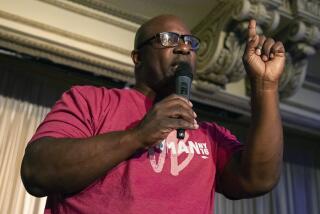After a Calm Campaign, Poll Predicts Jamaica Is Likely to Turn Left
KINGSTON, Jamaica — This Caribbean nation will decisively set aside eight years of Ronald Reagan-style pro-business government this week and veer to the left, according to an authoritative poll published Sunday, ending a short election campaign that has been surprising for its lack of passion and ideology.
Former Prime Minister Michael Manley, 64, whose costly socialist experiments and close ties to Fidel Castro’s Cuba during the 1970s alienated the United States and plunged Jamaica into chronic economic recession, is expected to be returned to power by a landslide in Thursday’s vote, according to the country’s leading pollster, Carl Stone, who has never failed to forecast accurately a Jamaican election.
Prime Minister Edward Seaga, 58, a Boston-born and Harvard-educated technocrat whose austere style, pro-business policies and close ties to Reagan have been credited with restoring economic credibility to the lush but troubled island, trails by 14% in the Stone poll. Manley, a spell-binding campaigner who exudes personal charm, has outpaced the dour, autocratic Seaga by about the same percentage since voter polling began last year.
Negative Advertising
Although marked by flamboyantly negative advertising and hints of planned violence from both sides, the campaign pitting Manley’s People’s National Party against Seaga’s ruling Jamaica Labor Party has been surprising for its relative gentility in a country more accustomed to political bloodshed.
When Seaga won Jamaica’s last contested election in 1980, local rivalries and sharp ideological differences between the two party leaders contributed to the bloodiest campaign in the country’s turbulent political history. More than 700 people died in election-related violence during nine months of campaigning.
But three new elements in the current campaign have so cooled rival passions that there have been just a handful of armed clashes, leaving only eight people dead and a score injured.
Most important, according to Jamaican political scientists, was a peace agreement signed publicly by Manley and Seaga last August. Both vowed to curb the armed gangs historically associated with the two rival parties and established a monitoring system under an impartial ombudsman, to oversee campaign behavior.
Shortness of Campaign
Another factor has been the shortness of the campaign--little more than three weeks--in contrast to the months of inflammatory electioneering eight years ago.
The third element has been the blurring of philosophical differences between the conservative Seaga and the once radical Manley. Their formerly sharp ideological contrast was lost when Manley abandoned radical socialism and turned toward the political center with what he called “democratic socialism” several years ago.
In a measured and apparently successful campaign to build a new, pro-business image, the one-time firebrand confessed that many of his radical social and foreign policies of the 1970s were mistaken and set about fence-mending with old enemies among Washington policy-makers, international bankers and local and foreign business executives.
Today the same American officials who just five years ago would have been appalled by the prospect of Manley’s return to power appear sanguine about his likely victory.
“I don’t think anyone in Washington is scared of being overrun by Cubans this time,” said one. “We’re not fearful of Manley coming back.”
During his two terms as prime minister from 1972 to 1980, Manley invited hundreds of Cuban advisers to Jamaica, broke off relations with the International Monetary Fund and provoked Washington into virtually suspending U.S. aid when he endorsed Castro’s dispatch of Cuban troops to Angola.
Diplomatic Relations
Recently Manley has pledged to restore diplomatic relations with neighboring Cuba, broken off by Seaga on his inauguration day in October, 1980, but “on a very moderate basis . . . moderate, appropriate and shall we say seemly.”
In a Sunday press conference, Manley said he felt confident after talks last year with then-Secretary of State George P. Shultz that his Cuba policy “will not again become a source of internal tension and will not again cause difficulties with the United States.” Even the staunchly anti-Communist Seaga has shown a slight softening toward Cuba, confessing during a press conference Friday that “we are anxiously looking at Cuba to see if there has been any change.”
Seaga’s campaign has focused on his acknowledged competence as a financial manager who not only brought stability to the nation’s still sluggish economy but also deftly attracted $600 million in foreign aid to help repair the estimated $1 billion of damage caused by Hurricane Gilbert. But Seaga’s eight-year austerity program, employed to right what business executives here said was a capsizing economy, included a paring of social services and a currency devaluation that left most Jamaicans feeling poorer than ever.
“The economy is on a stronger footing,” said a longtime diplomat here, “but there is a problem with income distribution. Businessmen are better off, but not the poor.”
Upbeat Climate
Manley has focused his campaign on restoring social services while encouraging the upbeat business climate that has led to a growth rate of 4% and 5% during the last two years.
Two other factors that may have contributed to the relative campaign calm were Hurricane Gilbert, whose devastating effects last Sept. 12 inspired a still-lingering spirit of cooperation among Jamaicans anxious to revive the stunned country, and growing sensitivity to the effects of violence on tourism, the nation’s leading money-earner.
Both parties have pleaded with constituents to put on their most welcoming manner during an election campaign that has punctuated the middle of the high tourist season, just regaining health after a backlash of cancellations following the September hurricane.
More to Read
Sign up for Essential California
The most important California stories and recommendations in your inbox every morning.
You may occasionally receive promotional content from the Los Angeles Times.










